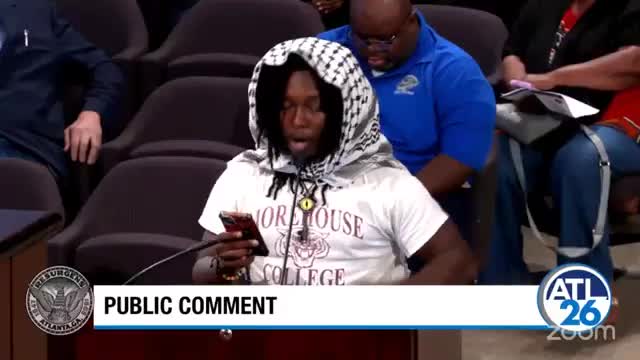Atlanta City Council proclaims ‘Winfield Ward Murray Day,’ spotlights Morehouse prison education
Get AI-powered insights, summaries, and transcripts
Subscribe
Summary
The Atlanta City Council on Oct. 6 honored Judge Winfield Ward Murray and Morehouse College’s programs teaching incarcerated students, with speakers and alumni citing lower recidivism and civic benefits from prison-based higher education.
Atlanta City Council members on Oct. 6 presented a proclamation recognizing Judge Winfield Ward Murray and Morehouse College’s work providing accredited college-level courses inside Georgia prisons.
Council member Andrea L. Boone presented the proclamation in a ceremony at City Hall that drew Morehouse alumni, faculty and students and speakers who described Murray’s classes and Morehouse’s Andrew Young Center for Global Leadership program for incarcerated students.
The proclamation, adopted by the council, recognized Murray’s role as a Morehouse professor and as an immigration judge and cited research and local practice the council heard described during the ceremony: speakers said sustained college coursework is associated with markedly lower rates of recidivism among people who are incarcerated and highlighted educational programs run by Common Good Atlanta and Morehouse.
“My name is Winfield Ward Murray” and “as a professor at Morehouse, teaching inside the prison and demanding the same level of work that we demand from our traditional students has been a transformative experience,” Judge Winfield Ward Murray said, thanking the Andrew Young Center and Common Good Atlanta.
Speakers described classroom experiences at the Burroughs (sometimes transcribed as Burris/Burrows) Correctional Facility and argued that college access inside prisons reduces repeat offenses and improves reentry outcomes. Meredith Lilly, a Morehouse alumnus and speaker at the ceremony, praised Murray’s mentorship and noted the program’s combination of Morehouse students and incarcerated students in shared classes.
Council member Andrea L. Boone said the council was recognizing the “uncompromising collegiate education within the Georgia prison system provided by professor Judge Winfield Ward Murray,” and the room heard several personal accounts from the program’s students and instructors.
Why it matters: Speakers at the ceremony repeatedly framed prison-based college programs as public-safety and reentry tools. The council’s proclamation frames Morehouse’s work as part of a citywide interest in reducing recidivism and supporting successful reentry.
What the council did: The council adopted a proclamation recognizing Murray’s work and declaring a day in his honor; the ceremonial action does not create new policy or funding but signals city-level recognition and public support for prison-based higher education.
Voices at the ceremony - “It is rare that this type of work is acknowledged, valued, and appreciated,” Murray said in his remarks, thanking Council member Boone and the Andrew Young Center. - Meredith Lilly, attorney and speaker at the podium, called Murray “a man who lifts as he climbs,” and said his teaching inside prisons “gives context and education to prisoners, men who are largely forgotten by society.”
Background and context Speakers and the proclamation cited national and local statistics repeated during remarks: that two-thirds of incarcerated individuals in Georgia return to prison within five years absent sustained intervention, and that educational attainment inside prison correlates with lower recidivism rates. Speakers at the ceremony argued Morehouse’s sustained coursework—equivalent to an associate or bachelor’s degree—reduces the likelihood of reoffending and increases post-release employment and family stability.
What’s next: The proclamation is an acknowledgment; it does not appropriate city funds or change department responsibilities. Morehouse College and partner organizations continue to manage program operations and external funding.
Speakers (as identified in the council record) - Winfield Ward Murray, Morehouse professor and United States immigration judge (honoree) - Andrea L. Boone, Atlanta City Council member (sponsor of proclamation) - Meredith Lilly, Esq., speaker and Morehouse affiliate - Ronald Freeman, speaker and Morehouse alumnus - Daxton Pettus, speaker and program participant - Deb Miller Landau, speaker and program supporter
Notes and clarifications: The ceremony included a video and multiple speakers representing Morehouse and partner nonprofits. The council’s action was ceremonial (a proclamation) rather than an appropriation or ordinance. Statements of program outcomes reported at the ceremony were attributed to speakers and the proclamation text; the article reports those claims as such without independent verification.
